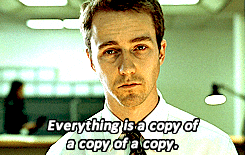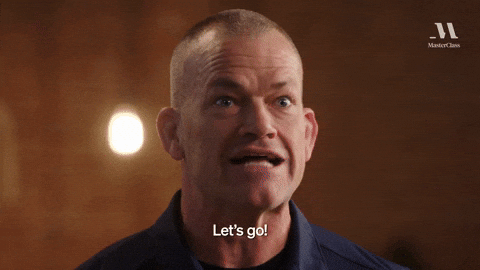Escape the Failed Startup Spiral (Before It Destroys Your Career)
The playbook for executives trapped in failed startup hell who need to return to real money and stability.
If you're excited for today’s monster, you probably ignored last week's warning about startup career suicide.
In your defense, the number of millionaires minted from tech glory has been awfully compelling.
Maybe you thought you were different. Maybe you believed your astute experience would somehow overcome the statistical impossibilities that crush most executives who chase startup lottery tickets.
Or maybe you're just unlucky enough to be living through what I call the "failed startup spiral"—that soul-crushing pattern of 4-18 month tenures at companies under $50 million in revenue that turns accomplished executives into damaged goods.
Either way…
Here's what the failed startup spiral looks like from the inside.
You join a promising startup as VP of Sales. The bros founders went to Stanford. The Series A was led by a recognizable VC firm. The product has real traction.
Everything looks legit.
Eighteen glorious months later, you're updating your LinkedIn profile again.
Except, you were actually only there for eleven months, missed the cliff vest, and extended out the timeline on LinkedIn in case the general public thought you couldn’t hack it.
Maybe the company ran out of runway. Maybe the founders imploded. Maybe the board pivoted away from your role. Maybe your air cover got blown when the CMO got hammered at a company offsite and blew up their career with a very hard to watch mental breakdown.
Yeah, that happened to me once…
The specific reason doesn't matter.
What matters is that you're now explaining to anyone who will listen why you couldn't make it work at a 47-person company when you used to run divisions with 500+ employees.
Remember: LinkedIn is just Instagram for careers—all highlights, no lowlights. Those flawless profiles? Fiction. When someone shows 5 startups with zero gaps, they're hiding something. Maybe they stretched 11 months to look like 18. Maybe they skipped the 4-month disaster entirely. Many are rewriting history to look amazing. Don’t be fooled.
Today’s job searches are intense.
You're not just job hunting—you're scouring a market where searches that used to take 3 months now stretch 8-18+ months.
Your bruises are more noticeable—and now people are poking them to see if they hurt.
Hell, I’ve seen execs endure a 2 year hiatus before re-entering the workforce at a comp plan they last took in 2010.
So you take another startup role to pay the bills and maintain momentum.
Because what else are you going to do? Sit idle for a year while your skills atrophy and your network forgets about you?
The second startup lasts 14 months. Different reasons, same outcome.
Now you're really in a pickle. You've got two consecutive short tenures on your resume.
Recruiters start viewing you as a flight risk. Your compensation expectations get reset downward because your last two roles paid below your previous corporate rate—and even you question you.
But the bills don't stop coming, so you take a third startup role—sometimes at an even lower compensation because your negotiating position has been destroyed.
The cycle repeats.
Each failed startup chips away at your confidence, your network's faith in your judgment, and your own belief in your market value. You start considering roles you would have laughed at five years ago—and you’re frustratingly ghosted from these C-Tier roles as well.
Sigh.
This is the failed startup spiral.
It's not about one bad decision. It's about how that first decision creates a cascade of compromised choices that systematically destroy the career capital you spent decades building.
The executives trapped in this spiral often blame themselves.
They don't often realize they're caught in a structural trap where the odds are stacked against them from day one.
If this sounds familiar, you're not alone.
I've seen hundreds of executives get destroyed by this pattern.
The damage is real, but fixable.
You're not dealing with isolated career setbacks—you're dealing with a systematic credibility destruction that requires precision to repair.
And few understand how to do it.
You can't just "interview better" or "pick better startups" your way out of this.
You need to fundamentally reset how the market perceives your value and your decision-making capability.
Mindset and narrative control is key.
The New Job Market Reality
The executive job market has fundamentally broken—at least compared to what we’ve been conditioned to expect over the last decade of frivolous bull market tech escapades.
What used to be a predictable 3-month search process has turned into a marathon.
I've watched brilliant executives navigate 18-month searches that would have been career-ending just five years ago—and many of them spent a grip on coaching, programs, and support to fix it.
Companies want proof you can deliver their future, not just evidence of your past success. The bar for "qualified" has shifted from having the right experience to demonstrating you can solve their specific, often undefined problems in real-time.
I’d argue that anyone with a pulse and a semi-functional understanding of techy three letter acronyms could land a job 40% above their pay grade back in 2021—but I digress.
This is tragic for failed startup survivors in 2025—because you can't afford to wait.
While a traditional corporate executive can weather a 12-month search with severance packages, savings, and the luxury of being selective, many are dealing with different math entirely.
Your last startup role probably paid 30-40% below market rate.
You likely have minimal severance—if any.
Your equity is worthless paper.
Your 401k hates that you’re not 59 ½ years old.
You're also aged enough to not be hip anymore.
And every month of unemployment makes your already-suspicious resume look worse.
So you're forced into survival mode while your big company peers get to play the long game.
Then you have to read my advice on how to build career leverage—and get pissed about how easy I make it sound for the top execs.
They can take time to carefully evaluate opportunities. They can maintain their compensation standards and negotiate from positions of strength.
However, if you’ve been ground down by startup shenanigans—you’re likely to make more decisions from positions of weakness.
Most executive roles aren't even posted publicly anymore.
They're being "passed around quietly" within networks, created in the shadows for specific candidates who are already in someone's back pocket.
I regularly see job descriptions with 1,500+ applications—but the hiring manager already has 3 finalists, all of whom have existing relationships with the executive leadership team.
I've coached those finalists. The game is rigged.
It’s not what you know, it's who you know.
The public posting?
That's often just legal theater to satisfy HR compliance requirements.
The real hiring happens through text messages, golf course conversations, and "hey, do you know anyone who could..." discussions over dinner.
If you're not already connected to the right folks when the opportunity hits, you're not getting the call.
Period.
This creates a vicious cycle.
Your startup tenures have disconnected you from traditional larger company networks. The founders and executives from your failed startups aren't exactly opening doors at Fortune 500 companies. Your references are scattered across companies that no longer exist or have been gutted by layoffs.
Meanwhile, your former peers have spent the same timeframe deepening their relationships with the exact people who control access to the roles you need.
They're getting dinner invitations while you're submitting applications into black holes.
They're getting "heads up" calls about upcoming opportunities while you're finding out through LinkedIn job alerts.
They're having their names whispered in meetings while you're paying $500/month+ for “premium job search platforms” that promise better visibility to opportunities that were already filled before they were posted.
This is why traditional job search advice fails startup spiral survivors.
"Network your way to opportunities" sounds great, but how do you network when your recent professional relationships are radioactive?
"Be patient and selective" is lovely counsel when you have the financial cushion to be patient and selective. And most of my clients will have that luxury—so I’m guilty as charged for sharing that counsel.
The reality is that you need income while you rebuild credibility, and the job market doesn't accommodate your situation.
You must stop playing by traditional job search rules and start ignoring the vast swaths of faux LinkedIn influencers driving your career off a cliff in exchange for a few shekels and a vanity following.
Waiting for the perfect opportunity while burning through savings is a losing game plan.
(Sorry about the trauma Seattle…)
Instead, the executives I’ve witnessed overcome this challenge start creating their own opportunities and additional income streams while they systematically rebuild their network.
They understand that in today's market, you need to be building, sharpening, and positioning yourself—not just waiting for someone else to validate your worth.
The smartest executives use an extended job search timeline strategically.
They treat their job search like a startup itself, with multiple revenue streams, partnerships, and a clear go-to-market.
Anna Mack calls this a portfolio career.
They're not just hunting for jobs—they're creating value, building relationships, and positioning themselves as the solution before the problem is even publicly acknowledged.
Thought leadership anyone?
In a market where roles are passed around quietly, you need to be the executive people think of when they have problems to solve, not the one they might remember if there happens to be an opening.
The Credibility Destruction Pattern
Every short tenure on your resume becomes a credibility landmine that can detonate at any moment during the interview process. The hiring manager isn't just evaluating your skills—they're conducting forensic analysis on your judgment, your ability to pick winners, and your staying power.
Here's what's running through their heads when they see your experience.
"This person couldn't make it work at three different startups. What's the common denominator?"
"Are they a flight risk?"
"Can they handle corporate navigation after bouncing between startups?"
The most damaging perception isn't that you're incompetent—it's that you're unreliable—even if that perception is misconstrued.
There are so many fakers in the market, can you blame recruiters and hiring managers for being skeptical?
Many executives value predictability above almost everything else.
They want team members who will stick around long enough to see initiatives through to completion, build relationships with people who matter, and deliver on long-term commitments.
They need someone that will make them look good.
Multiple short tenures signal the opposite of reliability, even though that’s how careers often grow these days.
They suggest you're either running from problems, creating problems, or fundamentally misunderstanding what you're signing up for.
The psychological trap is what makes this so insidious.
The more you try to explain why each startup failure wasn't your fault, the more defensive and unreliable you sound. You start sounding like the person who's had "bad luck" with five different relationships—maybe the problem isn't the other party.
Instead, you need to own your future narrative, not dwell on the past.
Hiring managers have heard every startup failure excuse in the book:
"The company ran out of funding" (Why didn't you see that coming and what impact did you—a leader at said company—have in its failure?)
"There was a pivot that eliminated my role" (Why weren't you involved in planning—why couldn’t you protect… you?)
"The founders had unrealistic expectations" (Why did you join without proper due diligence—could you not influence the founders with your deep experience?)
"The market shifted unexpectedly" (Isn't anticipating market shifts part of executive leadership—what specifically was unexpected and why?)
Every explanation makes you sound either naive or like you're shifting blame instead of taking ownership. Not traits synonymous with leadership.
Hiring managers aren't stupid.
They understand that startups fail for reasons beyond any individual executive's control. But they're not hiring you to succeed like you did before—they're hiring you to succeed at their company.
And their company's success depends on having executives who can navigate ambiguity, make good decisions under pressure, and commit to seeing things through even when circumstances aren't perfect.
Your experience suggests you struggle with exactly those requirements.
The credibility destruction goes deeper than just your professional track record. It attacks your executive presence and decision-making authority.
If you're interviewing for any VP+ role, hiring managers need to believe you can walk into their quarterly business review and command respect from seasoned executives.
But if you couldn't establish authority at a 35-person startup, how are you going to hold your own with division heads who've been with the company for 15 years?
If you couldn't navigate the relatively simple politics of a small team, how will you manage the complex relationships that define success?
If you couldn't make decisions stick at a startup where you probably had direct access to the CEO, how will you influence outcomes in a matrixed organization with multiple layers of approval?
The hiring manager is questioning whether you have the gravitas and staying power required for large company leadership. Your startup tenures become evidence of executive immaturity rather than entrepreneurial experience.
And importantly—that takeaway puts the hiring manager at risk. Therefore—they won’t email you back.
Ghosted again.
The pattern so vicious because it quickly becomes self-reinforcing.
The more interviews you bomb because of credibility concerns, the more desperate you become. The more desperate you become, the more likely you are to accept another suboptimal startup role just to generate income and maintain momentum. The more likely you bend your boundaries and contort your experience to fit whatever they want—not what you want.
Each additional short tenure makes the next interview cycle even harder.
You're not just explaining one or two startup failures anymore—you're explaining a pattern of poor career decisions that spans multiple years.
You'll be hired at below-market compensation because the company sees you as a "reclamation project" rather than a proven executive.
They may pick up your broken career pieces as a bargain—but hey—sometimes we need that opportunity.
You'll be under extra scrutiny during your first 12-18 months. Any performance issues or cultural misalignment will be attributed to you—rather than normal adjustment and executive onboarding challenges.
The most successful executives understand that credibility is like a bank account—every decision either makes deposits or withdrawals. Startup failures are massive withdrawals that take years of consistent performance to offset—or a savagely perfected narrative that influences whoever you have on the other end of the line.
But the good news is that credibility can be systematically rebuilt if you understand the specific perceptions you need to address and the narratives that actually work with hiring managers.
Stop the bleeding before the pattern becomes irreversible, and learn to frame your startup experience as learning and growth rather than a series of failures.
The Interview Minefield
Hiring managers have perfected the art of exposing failed startup spiral patterns through seemingly innocent questions.
They're not trying to be cruel—they're trying to protect themselves from making a bad hire that could damage their own credibility.
The Tenure Interrogation
"I notice you were at StartupCorp for only 14 months. Can you walk me through what happened?"
The Wrong Answer:
"Well, the company ran out of funding and had to do layoffs. The founders made some poor decisions and the market conditions were challenging."
This response screams blame-shifting, lack of ownership, poor judgment in joining, and inability to influence outcomes.
The Right Framework:
"I joined StartupCorp to understand how payment tech disrupts banking. I built enterprise sales from zero to $2.3M in 14 months. When they pivoted away from my expertise, it created a natural transition."
Notice what this does. Ownership of the decision, specific business outcomes, learning/growth, natural conclusion rather than failure.
The Pattern Recognition Test
"Looking at your recent experience, you've had three roles in four years. How do I know you won't leave us after 18 months?"
The Wrong Answer:
"I'm definitely ready to settle down and find a long-term home. I've learned my lesson about startups and just want stability now."
This sounds desperate and suggests your previous moves were mistakes rather than smart decisions.
The Right Framework:
“I spent three years exploring how different tech segments solve problems I'm passionate about. StartupA: AI in customer service. StartupB: scaling in regulated markets. StartupC: product-market fit dynamics. Each gave me insights you can't get from the outside.”
This reframes multiple short tenures as learning rather than a pattern of failure.
The Executive Judgment Challenge
"You joined three startups that ultimately didn't work out. What does that say about your ability to evaluate opportunities?"
The Wrong Answer:
"The startups looked promising when I joined them, but things changed quickly in ways I couldn't have predicted."
This suggests poor due diligence and inability to assess risk.
The Right Framework:
“Three years inside these companies gave me firsthand knowledge rather than guaranteed outcomes. I’m happy with that investment. Now I know how enterprises adopt AI, how regulation shapes product development, and where scaling breaks down.”
This positions startup "failures" as learning and growth experiences that larger company executives often lack.
The Commitment Test
"How do I know you won't get bored with corporate pace and structure after being in startup environments?"
The Wrong Answer:
"I'm tired of the startup chaos and ready for some stability and structure."
This makes you sound burned out rather than motivated.
The Right Framework:
"My startup experiences taught me to appreciate the advantages of corporate resources and infrastructure. Startups force you to be scrappy and move fast, but they also limit your ability to build sustainable, scalable solutions. Looking back on my career—I’ve made more impact working with larger teams. What excites you about my background?"
This positions your startup experience as complementary to corporate strengths rather than conflicting with them.
We also pivot the conversation to clarify why you’re in the room, which is part of the CLOSER framework we adapted from Alex Hormozi.
The Reference Reality Check:
"Can you provide references from your startup experiences?"
This is where many failed startup survivors panic because their references are scattered across failed companies or unavailable due to ongoing struggles.
The Strategic Response:
"Absolutely. While some of my startup colleagues are navigating their own transitions, I can connect you with [Former CEO name] who's now at [Current Company], [Former Board Member] who sits on several boards, and [Former Peer] who landed at [Corporate Company]. I'll also provide references from my earlier experience that can speak to my long-term performance patterns and leadership style. The combination gives you a complete picture of both my entrepreneurial adaptability and execution capabilities."
You must be proactive about reference challenges while positioning them as normal career transitions rather than desperate scrambling.
The psychological principle underlying all these responses is the same—reframe reactive decisions as proactive learning, position supposed weaknesses as unique strengths, and demonstrate self-awareness without defensiveness.
Remember—your verbal responses are only half the battle. The other half is managing the narrative before you ever get to the interview.
Narrative Surgery to Rebuild Your Story
Your resume and LinkedIn profile are telling a story about you—and right now, that story is "wannabe executive who can't make startups work."
That narrative is killing your opportunities before you ever get a chance to explain yourself in person. Recruiters are filtering you out based on pattern recognition, not performance evaluation.
You need narrative surgery.
Not resume optimization or LinkedIn tweaking—fundamental story reconstruction that repositions your startup experience as market intelligence rather than career desperation.
Many executives get stuck because they focus on perfecting their written materials while ignoring the mental framework that controls how they think and talk about their experience.
From Victim to Leader
Every time you say "the startup failed," you're positioning yourself as a victim of circumstances beyond your control. Every time you explain why something "wasn't your fault," you're reinforcing the narrative that you're reactive rather than proactive.
Senior executives don't hire victims—at least not on purpose.
Stop thinking like someone who had things happen TO them. Start thinking like someone who made decisions FOR specific reasons.
The Growth Mindset Reframe
When networking contacts ask about your experience, your mental framework should be:
Instead of: "The company ran out of money and I got laid off."
Think: "I extracted maximum knowledge from that experience and achieved my learning objectives."
Instead of: "The founders made poor decisions that hurt the company."
Think: "I gained firsthand insight into common scaling mistakes that many executives only read about in case studies."
Instead of: "I should have seen the warning signs earlier."
Think: "I now have pattern recognition for startup risk factors that gives me an advantage in evaluating opportunities and building a resilient career."
This isn't about spinning failure into success. It's about taking extreme ownership of your learning and development.
The Extreme Ownership Framework
When you take extreme ownership of your startup experience, you're not making excuses—you're demonstrating executive maturity.
Here's how this sounds in conversation:
"I made the call to spend 3.5 years getting hands-on learning in high-growth startups. Some of those companies succeeded, some didn't, but I achieved my primary goal—developing an understanding of startup scaling challenges. That intelligence, combined with my prior big team experience, creates unique value for companies ready to bridge innovation with scale."
Notice the psychological positioning:
You made sound decisions (not reactive moves)
You achieved your objectives (not failed at someone else's)
You're offering unique value (not seeking sympathy)
You're forward-focused (not dwelling on past problems)
The Network Conversation
When reconnecting with your network, don't lead with your startup experience.
Lead with your thinking and market insights.
Instead of:
"I've been working at startups for the past few years and now I'm looking to get back into a bigger org..."
Try:
"I spent the last few years doing hands-on learning in emerging tech sectors. The insights I gained about enterprise adoption patterns and scaling challenges are pretty fascinating. I'm curious about your perspective on how larger companies are approaching some of these trends..."
This positions you as someone bringing intelligence TO the conversation, not seeking something FROM it.
The Recruiter Conversation Control
When recruiters call, control the narrative from the first sentence:
"My background combines 15 years of revenue leadership with hands on building from startups. I bring a unique hybrid perspective—which maybe why you’re interested in me. I understand both how to scale revenue with matrixed team resources and how emerging technologies actually get built and adopted by enterprise buyers. Companies hire me when they want to bridge that gap."
Then pause and simply ask, “What about my background is most interesting to you?”
You've already positioned yourself as an asset rather than a job seeker.
The Meta-Message
The overarching narrative you're building is:
"I chose to do the hard work of understanding markets from the inside rather than relying on secondhand analysis. That intelligence, combined with corporate experience, creates unique value for companies ready to move beyond conventional approaches."
This story positions your startup experience as learning and research rather than career mistakes, while maintaining executive credibility and demonstrating forward-thinking leadership.
But narrative surgery is just the beginning. You also need to systematically rebuild relationships with decision-makers who control access to opportunities.
Also—people will understand.
Startups are risky, you know how it is, ya know?
Sometimes a line as simple as, “I expect someone like you understands the risks of startup life more than most—you get me.” is enough to build shared identity and rapport quickly.
There is no need to wax poetic about all of the challenges. Simply acknowledge them, what you learned, and pivot to solving for the problem at hand and moving forward.
Get away from your past and into their future as soon as possible.
Your Re-Entry Plan
Even though everyone says,
"If it doesn't work out, you can always just go back."
You can't—at least not as flippantly as common advice would suggest.
You can't just flip a switch and return to bigger company life.
But there's a smart way to bridge the gap between where you are and where you want to be—and it doesn't involve sitting idle while burning through savings during a marathon job search.
Startup Roles as Fractional Bridges
Don't just wait for the perfect opportunity while your bank accounts drain.
Use startup engagements as income bridges while rebuilding your positioning—and pick up more leverage and new experience along the way.
This isn't about becoming a career fractional executive—that's a different trap with its own perception problems and a topic we’ll cover in a later edition of Execs and the City.
This is about using short-term engagements to maintain momentum, generate income, and gather market intelligence while you plan your re-entry.
Use Startup Opportunities as Income During Marathon Searches
Be open to short term advisory or project-based engagements that pay $500-$1000+ per hour while maintaining your availability for stronger opportunities.
These aren't full-blown career moves.
These are simply consulting projects that bridge your runway while you rebuild the networking relationships needed to enter a larger org or better fit opportunity.
Yes, you will need to create these opportunities. Let’s talk about how.
The Discovery/RFP Mindset
Every conversation during this phase should be approached like an RFP process—you're gathering intel, building relationships, and evaluating opportunities rather than yielding to whatever comes your way.
Serendipity is no longer an acceptable career strategy in this market.
Win the Job—Then Restructure the Engagement
I advise that job seekers pursue any full-time opportunity, even if it’s not the sexiest opportunity or a slam dunk match.
Then win the role (even if you don’t want it).
Be the only solution that they can see themselves working with. Then negotiate the structure when they can't meet your needs.
Now here me out.
Going into it, you knew that they would likely not be able to meet your salary needs; however, if you’re playing the long game and surviving an extended executive search, you’d know that you shouldn’t be passing up on exploring any opportunities too early.
Plus—you have plenty of value to provide, but maybe you don’t need to give them 80 hours a week of value—maybe 15 will suffice.
And as long as you preserve your optionality by not poorly anchoring yourself financially by answering, “how much money do you want?” incorrectly—you’ll have an option to still get paid for your troubles in a long-winded interview process for a poor fit role.
When they say:
"We'd love to offer you the CRO role, but our budget caps at $400K and you're looking for $700K+."
You respond:
"I appreciate you extending an offer and I think we both know we need to make an impact right away. Given the budget constraints, what if we structured this as a consulting agreement to start? That way we can tackle immediate challenges and set the team up for success—and give us both a chance to evaluate fit.”
Some of my highest-profile clients demand non-committal consulting projects so both parties can date each other before getting married.
One client of mine demands 90 day trials with 2-3 companies concurrently at $750+ an hour to assess if the company is a winner or not. Because of their track record of a multi-billion dollar exit—they need to be exceptionally mindful about what move they make next.
I think they also do this because business is intellectually challenging for them, so even though they don’t need the money like you or I—they’re in it for passion.
So when you land a 15 hour consulting project for no-name startup not going anywhere—don’t talk about it.
It’s like that one partner you dated to get your ‘needs’ met, but couldn’t bear to tell your friends because you were embarrassed of what they might think.
People will notice if you take a dumb job and talk about it publicly. So don’t talk about it yet. Test the waters for alignment—and if it rocks—then tell the world.
This approach lets you:
Generate immediate income
Demonstrate value before commitment
Maintain job search flexibility
Build relationships without burning bridges
Test company culture and viability
Building Relationships While Maintaining Re-Entry Optionality
You must maintain optionality while building value.
You're not committing to startup life—you're using startup projects to strengthen your positioning and market knowledge. How you present your narrative moving forward is what’s most important to this positioning.
Every engagement should be structured with clear end dates, specific deliverables, and corporate-friendly positioning:
"I'm working with [StartupName] on a 4-month project while I evaluate long-term opportunities. The project gives me hands-on insight into emerging market dynamics that will be valuable for larger implementations."
This frames startup and consulting work as smart rather than desperation.
"I'm Using This Time to Build, Sharpen, and Position Myself"
This is your mental framework for the entire transition period. You're not unemployed—you're in development mode. Now is the time to bridge paths into new industries or functional expertise as well.
You can date before you get married.
When network contacts ask what you're doing, your response should be:
"I'm using this period to learn through consulting projects with multiple business models, sharpening my network, and positioning myself for the right long-term opportunity."
Or you know, something in your voice.
Target Company Identification for Re-Entry
Not all larger company opportunities are created equal for startup survivors. You need to target companies that actually hire executives with startup experience rather than those that view it as a liability.
Prime targets:
Companies actively acquiring startups
Corporate venture arms and innovation labs
Mid-market companies scaling rapidly
Private equity-backed companies in growth phases
Large companies launching new business units
Avoid:
Traditional Fortune 500 companies with 20-year executive tenures
Highly regulated industries resistant to change
Companies with recent startup acquisition failures
Conservative cultures that value predictability over innovation
The Timeline Management
Your re-entry isn't a sprint—it's a process. Set realistic expectations.
Some people even fall in love with working on multiple unique projects concurrently and accelerating their learnings and make it their new full time work.
I know several executives making well over a million a year, self-employed, selling $50K/mo consulting packages to a half-dozen startups at a time.
Once you build confidence building multiple clients, closing deals that support your family, and the tax saving opportunities you’ll get on 1099—it can be difficult to put all of your eggs in one very questionably supported W2-only basket ever again.
The goal is to maintain momentum and income throughout this timeline rather than gamble everything on quick fixes or desperate moves.
And please remember—not every damn thing you do needs to be announced on LinkedIn…
"I simply cannot believe that I am incredibly blessed to take this amazing opportunity for WORKFORCE MANAGEMENT SOFTWARE AI SAAS PLATFORM INNOVATION. Thank you to (proceeds to tag 14 people who barely know them) for all of their support. WOW!"
Nobody is passionate about WORKFORCE MANAGEMENT SOFTWARE AI SAAS PLATFORM INNOVATION—not even the founders.
Plus, we all know you'll be sharing another one of those posts in a few months.
Not everyone needs a soap box. And that's okay.
Prevention vs. Recovery
Early Warning Signs You're Entering the Failed Startup Spiral
If you're currently at a startup, watch for these red flags that signal it's time to exit before the pattern becomes permanent:
Runway extends less than 18 months without confirmed next funding
Board meetings shift from growth discussions to cost-cutting measures
Founder conflicts emerge around direction or equity
Key customer contracts get delayed or cancelled repeatedly
Your role responsibilities expand dramatically without title/compensation adjustments
They hire a new COO/CFO
They have any of the 7 Habits of Highly Toxic Companies
The moment you see two or more of these indicators, start your exit. Scope a consulting opportunity. Build your optionality and leverage. Don't wait for the official announcement. Or better yet, make it a habit to always build pipeline for your career.
If you build a well when you’re thirsty, it’s too late.
The harsh reality is that most executive careers can survive one startup "digression" but it becomes a lot more challenging to survive two, three, four consecutive short tenures.
Your first failed startup experience can be positioned as learning or hype exploration. Your second becomes a pattern of poor judgment. Your third makes you unemployable in larger team environments.
If your first startup doesn't work out, break the pattern before it becomes permanent.
Need help applying this? Upgrade to paid for monthly live sessions with Jacob.
Stay fearless, friends.















